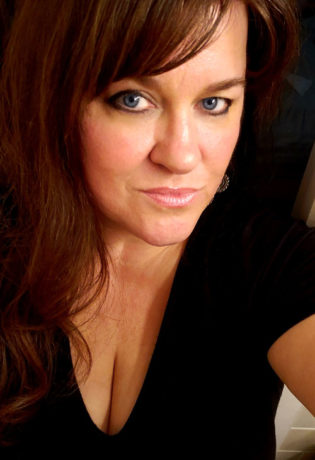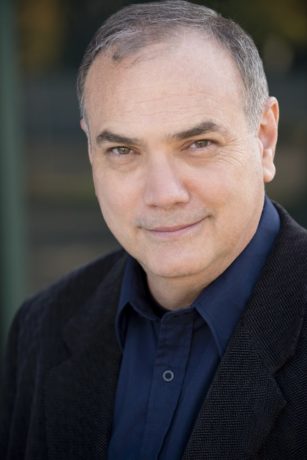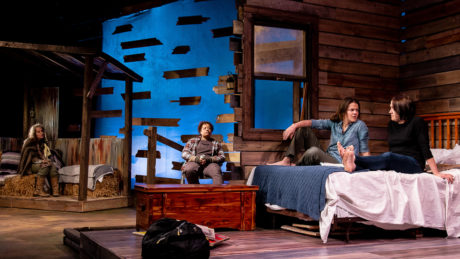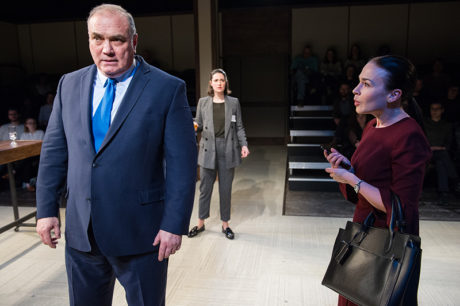What follows is an extraordinary conversation. It started as a Facebook post by award-winning playwright Audrey Cefaly. It was joined by her dear friend, acclaimed actor Elliott Bales, who doubles as a business and leadership consultant. And within a day it became an electric exchange that goes to the heart of whatever future live theater might have post-pandemic. As the COVID-19 crisis hangs heavy over our theater world, DC Theater Arts is proud to share the illuiminating thought leadership and imaginative visions of these two trenchant voices. —John Stoltenberg
Audrey Cefaly: I could be totally wrong on this. And I’m not here to debate what the definition of theater is. I’m more interested in rethinking the scope of what we really mean when we say “community,” and what technology can do to reach the larger audience.
Live theater was suffering from its own pandemic long before COVID-19. Empty seats. Lousy ticket sales. Loss of subscribers. But let’s not overlook all the new and future audiences we weren’t even reaching in the first place. What does it mean to be truly and unapologetically inclusive? Here is a partial list of people who don’t have the ways or means to experience our work live and in person:
The infirmed.
The nonambulatory.
The convalescing.
The terminally ill.
The sensory challenged.
The remotely located.
The overworked.
The underpaid.
The mentally impaired.
The visually impaired.
The single parents.
The new moms.
The latchkey kids.
The night-working artists.
The night-working non-artists.
The students.
The homeschooled.
The no-car households.
The agoraphobics.
The ex-pats.
The deployed.
Kids who are searching alone, maybe questioning, sometimes suicidal because nothing in their universe feels like home.
Teachers looking for classroom content.
Drama kids.
Non–drama kids who enjoy stories about history, science, politics, sports.
People like you or me, who want to support independent and student-made theater all over the world.
On and on and on.
Maybe… I’m just saying maybe… let’s smarten up. Learn the technology. Remove the barriers and think globally. Consider what a revolution could do to bring theater into the fore and into every home and classroom in the world. Allow the conditions under which innovation and job growth in our industry can truly flourish. Allow the conditions that encourage young and new audiences. Allow the conditions where teachers can expand theater outside the drama class and combine it with all disciplines. Allow the conditions whereby media-addicted kids can be taught in a medium they are already passionate about.

This moment is not just a distress call. It is the inevitable collapse of a system that refuses to innovate and expand outside of its local jurisdiction. We are an industry that protects artists to their own detriment. That values intellectual property at the expense of a living wage. At the expense of our children’s education. At the expense of audience cultivation. At the expense of job growth. At the expense of human dignity.
Theater is in trouble not because of a worldwide pandemic. It is in trouble because of its unwillingness to evolve. Adapt or Die. Attention must be paid.
Elliott Bales: This is the art form that has been dying for 3,000 years so, no, it isn’t. What you are advocating is emergent forms of art, that have their own method of connection. At the heart of all of it is storytelling. That has not and will not change. The forms we use to communicate those stories have been adapting. And live performance has been including technologies since its inception. So the fundamental premise that we must innovate or die is a false dichotomy. We will continue to find new ways to tell stories. But no, theater is not dead and will not die.
Audrey: Elliott, my dear friend. We have had such discussions many times. And I am fully aware that you are an expert on the business of theater. So tell me then, why do theater makers continue with the insistence that the internet is our enemy? That is what I mean when I say “technology.” At the root of it is an entrenched binary: live theater or no theater. But what we have now in this very very painful moment is what I call a “smartening.” Legions of people, once practically allergic to online trickery, are suddenly Zoom experts, and they are beginning to teach what they know. For me, this is the most promising part. Our age of enlightenment is indisputably upon us. What follows is an emboldened populace unwilling to revert back to a neutered and shackled status quo. We will see this now, a rebellious faction—brandishing a “never again” war flag—push us kicking and screaming into the light. Into an age of prosperity for our industry. Of job growth and innovation. This is my prediction.
“If we continue with the false notion that we can exist on local audiences alone, we simply will not survive.”
To be clear… my central argument is not about emergent forms of art. I’m starting with an idea more clearly defined: live theater, filmed for playback or livestream.
And in terms of theater “dying”—I define that as our lost audiences dilemma, which is worsening every year.
No one is suggesting film take the place of live—of course, live is ideal. With that said: If we continue with the false notion that we can exist on local audiences alone, we simply will not survive.
I envision a world where professional filmmakers are embedded directly into the theater space and work closely under the same roof with its artists to create a cinematic rendering of the play for livestream. I do believe that getting in bed with film is the only way we are going to ultimately survive. So why not hire film experts to do the proper translation from live to film? Storyboards. Shot lists. Distinct sound and light plots. A live studio audience. Even script alterations where the author recommends. (Yes, I’m thinking big here.) I’m imagining separate rehearsals for film. Teaching actors how to alter a line or work a camera for the more intricate maneuvers. Teaching them how to modify their volume for film. And no, this doesn’t have to mean crappy productions are produced whether we like it or not. This can all be handled with a 100% vote requirement from the whole team in the days after opening night.
The ultimate goals being:
• an adrenaline shot in the form of job creation
• more revenue, and more work for designers, directors, actors, musicians, and playwrights
• limitless educational content for impoverished students in small-town and inner-city America.
• an inclusive strategy that allows all of your friends and family from all over the world to support live theater by paying to see your work in a production they’d otherwise never have the ways and means to experience
• audience cultivation
• a very big step in the direction of ADA compliance
• film training for stage actors
• greater exposure for talent
• greater exposure for theaters
• more grant opportunities for theater
• greater cash flow and operating capital for theaters

Elliott: I have always enjoyed magical realism in theater except in financial matters. This is magical economics. There is no greater operating capital, because almost twice as much is spent up front, before a single dime is earned, on the increased cost of production, extended rehearsal time, additional space rental, increased cost for each element. That presumes that you want to pay everyone a living wage, because we know that is currently how things are (eye roll). There is no more money coming into the theatrical community. We are only talking about how we divvy up the existing pie. The only way to add to the economic value (worth is a matter of position, not intrinsic—value is intrinsic, tangible) is to move away from the non-profit, begging-for-money, dependence-on-government-and-wealthy-donor model to which the American theater has become addicted. Our theaters must become real estate spaces, prop shops as furniture and furnishing stores, costume shops as sewing lounges and ateliers. And the list goes on. Only then can we become vital contributors to the economic well-being with an actual soul that our neighborhoods desperately need. Only then will we be the responsible employers we want to be but can’t afford to be. Your model will increase costs, eliminate jobs and opportunities, migrate the work to more of the largest companies who will do Annie and Christmas Carol three times a year, and set new-play endeavors back to the elitist Stone Age. You advocate the very thing that would kill what you want to build.
Audrey: If we had at least one research lab, run by field experts… an educational lab of some sort… along with grad students who can test and document, then I’d feel a whole lot better. We don’t have the information yet, because the model has not been studied. I still maintain that it is absolutely plausible that not only will the pie get bigger… but the overhead will get smaller. Especially as technicians and film-translator project teams evolve, streamline workflow, and work at speed.
For a theater the size of Arena. If we assume a livestream version of A Christmas Carol sells 500 virtual tickets that they never would or could have sold in the first place… sales that energize and invigorate an ever bigger virtual fan base and revenue stream… not to mention ad sales and video content monetization… to me that feels like we are decidedly in the black, even with the film overhead. One need only look to the YouTube influencer movement to see it in action. That is the real power of social media. When our content starts to not only pay for itself but creates its own revenue stream simply by being popular.
Indie musicians got this memo over a decade ago.
Elliott: People are not going to pay $75 to sit on their sofa and watch another version of Christmas Carol. Or any other streamed performance of anything. In the current model of funding for such a one-off film viewing experience, we are running at best $4.99 a pop. And why would I watch Arena’s production when I could watch the National, or the Royal Shakespeare, much less some smaller company? That additional $2,500 in revenue is going to get you what quality of a film? How many extra rehearsal weeks? How many extra hours of rehearsal time to pull off this event? That is the SME/grad student lab experiment. Show me how much time and people it takes to pull that off. Then we will at least know the expense side.
Audrey: Why would you watch it? Because you’re all the way in Iowa and your granddaughter is in the show.
Elliott: As to the red herring of indie musicians, their audiences are not national. They are hyper local, with a smattering of followers outside the territories they play. Indie musicians make money by playing larger and larger venues, not because their music is streamed. That is their marketing program, not their revenue-generating activity. They gather a following in the online world when people find them for free, then maybe buy a few songs and hopefully come to a concert and buy a t-shirt. The revenue does not come from where the art is seen; it comes from the art being good and people coming to see it.
Audrey: I’m imagining maybe two to four extra hours of rehearsal plus one extra performance for filming.
Elliott: I have done that much just to shoot a trailer or a commercial. The underlying assumption is wrong.
“We have to completely rebuild theaters’ economic model, including new media and markets.”
As to my granddaughter being in it, a two-hander love story will never get that treatment because there are only four grandparents and we are all practicing daisy pushing. So, again, we are talking about killing new work and not being able to afford small companies reaching out to those disenfranchised or smaller interest groups you are advocating.
Audrey: Not necessarily. Students buy tickets. Because their school or their parents lead them there. What say you of this use case?
Elliott: At its core, you are calling for a macroeconomic WalMart of theater that drives every mom and pop shop in each little town out of business, only to shut down and abandon them when the big-dollar revenue target isn’t reached. The surest way to create more artistic wastelands.
Student and family tickets are exactly why every high school musical has 60 kids in it. And they work for free.
Audrey: Keegan can target school markets with added grant money they would qualify for. In the U.S. Open, anyone can reach visibility. And quality is quality.
Elliott: So we’re going to pay a living wage to a cast of 60 so their friends and family can watch it on YouTube? That’s the economic plan?
Audrey: No, we are going to produce a crystalline production of a low-overhead TYA piece at a small but mighty theater and capture the loyalty of the school market.
Every poor marginalized kid in the South needs to know the MLK story. How exactly are they getting that in a way that really truly reaches them? Inspires them? A documentary from the school library? A feature film? Katori Hall wrote an incredibly popular MLK story [The Mountaintop]. But only local kids in our local “communities” get to see it. It doesn’t have to be that way. Educational content should be readily accessible. And there is grant money for just such an endeavor.
Elliott: I get your points. Just think they are the wrong revolution. The core argument is economic. It has nothing to do with streaming or video or live or anything of the sort. Prior to 1969 and the change to the tax code allowing the incorporation of theaters (and other nonprofits) under 501(c)3, theaters had to earn the money that they made and paid. Since then, theaters have operated under Keynesian economics, essentially as debt-generation machines. Keynes himself said this would only work a century, and that was for nation states. So theaters make roughly, most less than, a quarter of their revenue from ticket sales. The rest is “borrowed” from donors, foundations, and governments. These are sunk dollars, not investments. And must be replaced next year or the company stops. This is an economic model that cannot continue. There will be no new consumers of theater from streaming. A crappy, static videotaped copy of a live performance (ok, that’s dating me) in no way stands up to a film artistically crafted for that medium. So theaters will lose money to film, paying additional dollars that they don’t have to all of the artists for their contributions, for an audience that doesn’t want it. I’m happy to see any empirical data that comes from streaming or internet performances showing that new audiences were engaged. But I don’t see anyone clamoring for theatrical performances who don’t already go to the theater. We have to completely rebuild theaters’ economic model, including new media and markets. But that requires the forest fire that is happening now that will kill off all the little vanity companies so we can potentially build a new economic model for art.
Audrey: That last bit. That’s what I’m getting at. And for the record, I’d rather debate you than just about anyone.
Exit, pursued by AEA.

Audrey Cefaly is a web developer with over 20 years of print and web design experience. She is also the Web and UX Lead for the newly formed Theater Maker Technology Task Force. Her plays include The Gulf (Edgerton, Lammy, Charles MacArthur Nominee), Alabaster (NNPN Record-Breaking RWP, Kilroys, Calicchio Prize), Maytag Virgin, The Last Wide Open, The Story of Walter, Fin & Euba, Tell Me Something Good, The Believers, and Love is a Blue Tick Hound. Cefaly is a Dramatist Guild Traveling Master and a member of the Playwrights’ Arena cohort at Arena Stage. She is published by Samuel French, Smith & Kraus, and Applause Books. Cefaly has developed plays with NNPN, Everyman Theatre, Signature Theatre, Vermont Stage, 16th Street Theater, Capital Stage, Cincinnati Playhouse, About Face, Florida Rep, Kitchen Dog Theatre, Circle Theatre, Serenbe Playhouse, Aurora Theatre, Theater Alliance, Quotidian Theatre Company, Contemporary American Theater Festival, and University of Alabama at Birmingham.

Elliott Bales is a strategist, operational planner, and consultant at Board Veritas with over 30 years of experience in government, commercial, and the non-profit sectors. He is also an actor and veteran living in the Washington, DC. metropolitan area. After a 26-year career in the United States Army, he finally returned to the path of storyteller he began some five decades ago. His recent work in theater includes productions at Arena Stage, Studio Theater, Folger Theater, Theater Alliance, 1st Stage, Riverside Theater and Spooky Action Theater. For six years he has worked on the staff and Board of Directors of Theater Alliance in Anacostia. A life of real-world experience in the military, industry, and nonprofit sectors provides the material to infuse characters with a genuineness and relatability that connects with audiences, critics, and fellow performers. His work ethic and commitment to the production team as a dedicated partner are hallmarks of his efforts on every project.





Elliott is spot on; people who go to live theatre go because they love theatre. People who don’t love theatre aren’t going to watch it online.
Some good points being made here by Elliot Bales. However, I was waiting for him to mention the obvious. Theater/re does not exist without a live audience. The audience makes the performance and the performers experience something different at each performance. The audience makes the performance different each night simply because they are there. The reactions of an audience, or lack there of can push actors to levels not seen in a previous performance. A recorded live performance is a video record and that is all.